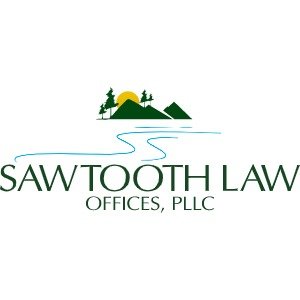Best Tax Increment Financing Lawyers in Challis
Share your needs with us, get contacted by law firms.
Free. Takes 2 min.
List of the best lawyers in Challis, United States
About Tax Increment Financing Law in Challis, United States
Tax Increment Financing (TIF) is a public financing method used to subsidize community improvement projects, infrastructure development, and urban renewal in Challis, United States. TIF captures the future tax benefits of these developments to finance present improvements, effectively revitalizing underdeveloped areas without directly increasing taxes. This method is popular for its ability to attract private investment and promote economic growth in targeted regions.
Why You May Need a Lawyer
Engaging a lawyer may be necessary in various situations related to Tax Increment Financing. For instance, if you are a developer looking to initiate a project using TIF, a lawyer can help navigate local laws and regulations. Property owners might need legal assistance to understand how TIF affects their taxes or property value. Additionally, local governments planning to implement or manage TIF districts might require counsel to ensure compliance with relevant laws and policies. Legal advice is essential to mitigate risks, negotiate agreements, and resolve disputes related to TIF projects.
Local Laws Overview
Challis adheres to specific regulations governing Tax Increment Financing, which aligns with Idaho state laws. Key aspects include the establishment of TIF districts, which must meet particular criteria indicating economic distress or underdevelopment. The city's ordinances outline the maximum duration for TIF plans, often spanning 20 to 30 years. There are also requirements for transparency, including public hearings and detailed financial reporting. Compliance with these laws ensures that TIF benefits both the community and investors without imposing undue burdens on taxpayers.
Frequently Asked Questions
What exactly is Tax Increment Financing?
Tax Increment Financing is a financial mechanism that uses future tax revenues generated by increased property values from development projects to finance current urban renewal and infrastructure improvements.
How does TIF impact property taxes?
While TIF itself doesn't increase property taxes, it uses the increment in tax revenues resulting from heightened property values in a designated area for development projects.
Who is eligible to use TIF?
Local governments, developers, and businesses seeking to undertake development projects in designated TIF districts are typically eligible to utilize TIF funds.
What kind of projects can be financed using TIF?
Projects that may be financed through TIF typically include infrastructure improvements like roads and utilities, redevelopment of blighted areas, and community projects aimed at economic growth.
Are TIF districts permanent?
No, TIF districts are not permanent; they have a predetermined lifespan, which can vary but typically lasts between 20 and 30 years.
Can TIF funds be used for any project?
No, TIF funds are generally restricted to projects that meet specific criteria, such as contributing to public infrastructure or economic development in designated areas.
How is a TIF district established?
A TIF district is established through a local government's proposal, followed by public hearings, and approval by the city council or a similar legislative body.
What are the alternatives to TIF for community development?
Alternatives might include municipal bonds, public-private partnerships, or grants from state or federal governments aimed at urban development.
How does TIF affect the local economy?
TIF can stimulate economic development by incentivizing private investments, increasing employment opportunities, and potentially elevating local property values.
What are the risks associated with TIF?
Risks include project underperformance, which could leave public entities financially burdened, or inequitable development focusing benefits on specific areas or developers.
Additional Resources
For more information, individuals can consult resources such as the Idaho State Tax Commission, local government offices in Challis, or legal firms specializing in municipal finance and economic development. Attending local council meetings and reviewing public records of TIF activities can also be beneficial.
Next Steps
If you seek legal assistance with Tax Increment Financing in Challis, begin by consulting with experienced attorneys specializing in municipal and financial law. Gather all relevant documentation related to your case or project to provide clear information to the lawyer. Consider attending local workshops on TIF and reaching out to city officials for guidance on navigating local regulations. Ensure that any legal professional you engage is familiar with regional economic development practices and has a track record of successful TIF-related cases.
Lawzana helps you find the best lawyers and law firms in Challis through a curated and pre-screened list of qualified legal professionals. Our platform offers rankings and detailed profiles of attorneys and law firms, allowing you to compare based on practice areas, including Tax Increment Financing, experience, and client feedback.
Each profile includes a description of the firm's areas of practice, client reviews, team members and partners, year of establishment, spoken languages, office locations, contact information, social media presence, and any published articles or resources. Most firms on our platform speak English and are experienced in both local and international legal matters.
Get a quote from top-rated law firms in Challis, United States — quickly, securely, and without unnecessary hassle.
Disclaimer:
The information provided on this page is for general informational purposes only and does not constitute legal advice. While we strive to ensure the accuracy and relevance of the content, legal information may change over time, and interpretations of the law can vary. You should always consult with a qualified legal professional for advice specific to your situation.
We disclaim all liability for actions taken or not taken based on the content of this page. If you believe any information is incorrect or outdated, please contact us, and we will review and update it where appropriate.








